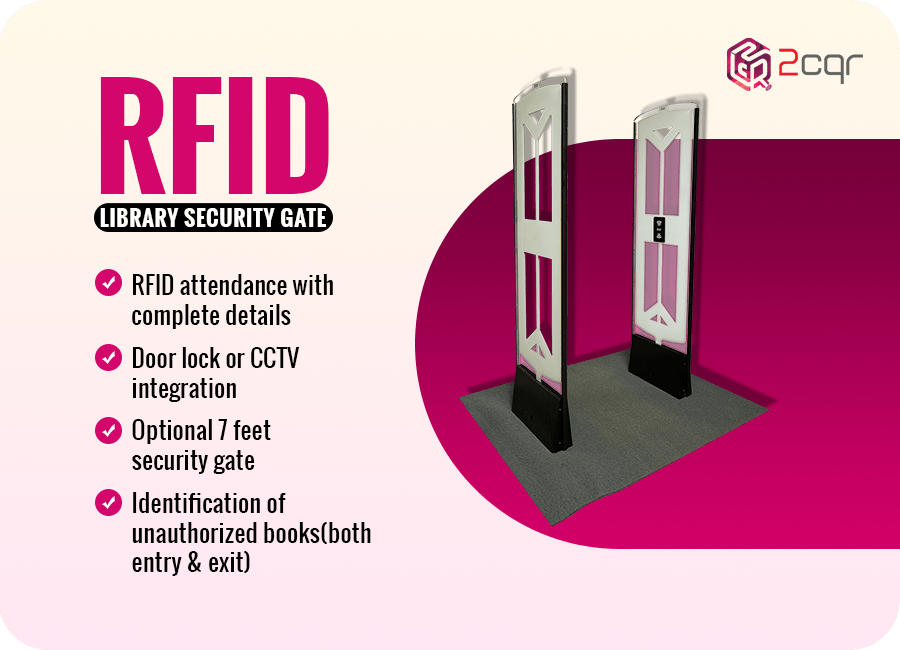
In the ever-evolving landscape of library management, the advent of RFID (Radio-Frequency Identification) technology has not just been a game-changer but a revolutionary force, offering innovative solutions to the various challenges faced by libraries. This transformation isn’t limited to public libraries alone, it extends its reach to the halls of educational institutions, where RFID Library services have emerged as a beacon of efficiency and organisation.
RFID smart cards, far more than a mere identification tool, these smart cards play a pivotal role in elevating the adoption of RFID solutions within educational libraries. The synergy between RFID technology and smart cards presents a compelling proposition, reshaping the way institutions manage their resources and students’ behaviour within the library and across the entire campus.
In this exploration, we delve into the diverse benefits that unfold with the implementation of RFID smart cards. These benefits not only streamline library services but also contribute to enhancing the overall efficiency of organising student behaviour, creating a seamless and technologically advanced environment for learning institutions.
Have a look at the transformative power of RFID smart cards in shaping the future of library services within educational institutions.
Behaviour Tracking
In the landscape of educational institutions, the introduction of RFID smart cards as multifunctional ID cards marks a transformative leap towards efficient organisation and enhanced student well-being.
These smart cards, seamlessly integrated with entry and exit gates across campuses, serve as more than just identification tools—they become powerful instruments for monitoring and tracking student behaviour. By capturing data on movement and actions throughout the campus, the management gains invaluable insights that pave the way for informed decision-making.
This real-time monitoring not only facilitates a proactive approach to address behavioural concerns but also allows for strategic interventions to improve overall student well-being. The RFID smart card system emerges not only as a technological solution for streamlined organisation but as a catalyst for fostering a positive and conducive learning environment within educational institutions.
Attendance
The incorporation of RFID library services, particularly through the utilisation of smart cards as multifaceted identification tools, revolutionises the landscape of educational institution management. With these smart cards seamlessly integrated into classroom entry points, the management gains effortless visibility into student attendance, eliminating the need for extensive manual efforts.
This newfound accessibility empowers swift follow-ups on students’ whereabouts, showcasing a tangible demonstration of the institution’s care, concern, and responsibility towards student growth. The technology not only streamlines organisational tasks but also symbolises a commitment to fostering an environment where student well-being and academic progress are prioritised.
Cashless Cards
In the realm of RFID library services, the deployment of smart cards equipped with advanced encryption features introduces a cashless system that extends beyond mere transactions. These smart cards become powerful tools for instilling discipline among students, seamlessly imposing fines for various activities such as tardiness, missing book return deadlines, or damaging library property.
The precision and efficiency of this cashless approach not only streamline administrative processes but also serve as a proactive means of maintaining order and responsibility within the educational institution. By integrating technology to monitor and regulate student activities, the smart card system becomes an integral component in fostering a culture of accountability and respect for shared resources, ensuring the smooth functioning of the library ecosystem.
Library Collection Improvements
Conducting a meticulous data audit within RFID library services, particularly within access control systems, emerges as a strategic asset for library staff seeking to optimise organisation and enhance user experiences.
This insightful analysis allows staff to conclude crucial patterns such as the most frequented areas within the library, the specific classes or groups of students making frequent visits, preferred book genres in demand, and peak timings of library utilisation.
Armed with these invaluable insights, library staff can make informed decisions, tailoring collection improvements to align with student needs and ensuring optimal staff availability during high-traffic periods. The utilisation of RFID smart cards not only streamlines access but becomes a catalyst for data-driven enhancements, fostering an environment where the library evolves dynamically to meet the ever-changing needs of its users.
Conclusion:
The integration of RFID library services and smart cards represents a paradigm shift in educational institution management, streamlining processes and prioritising student well-being. From efficient behaviour tracking to hassle-free attendance monitoring, these technologies showcase a commitment to nurturing a positive learning environment. The introduction of cashless cards adds a layer of discipline, seamlessly managing fines and maintaining order.
Moreover, the data-driven insights obtained through RFID smart cards empower library staff to make informed decisions for collection improvements, ensuring dynamic evolution to meet user needs. As we witness this technological revolution, it’s evident that RFID library services with smart cards are shaping the future of educational institutions, enhancing efficiency, and fostering a culture of accountability and respect for shared resources


